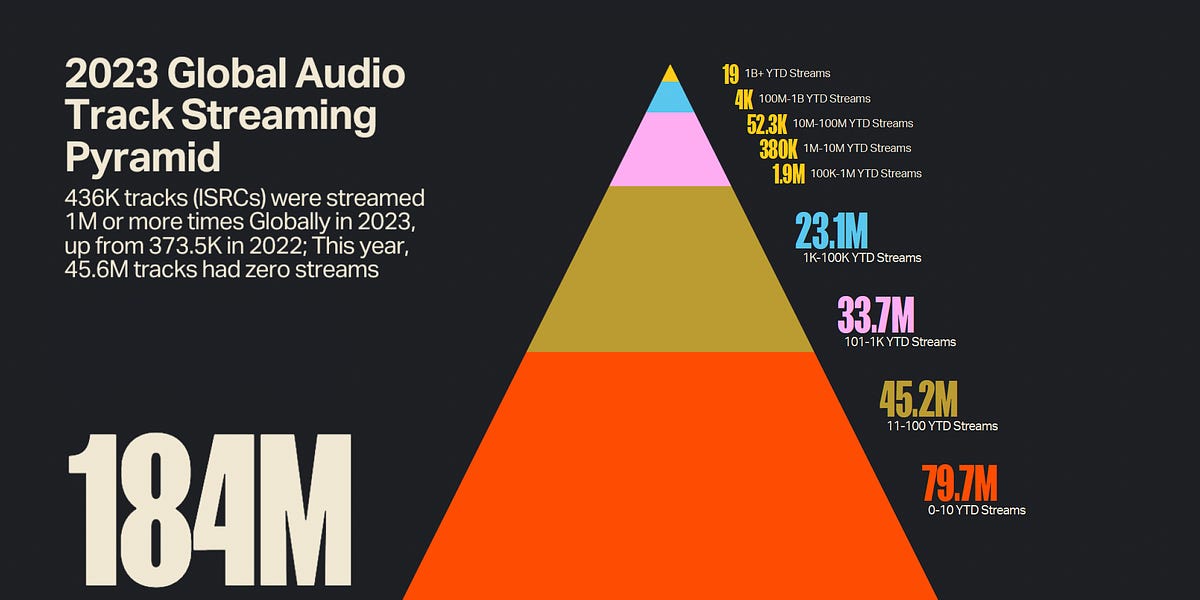Those Most Dependent
Is money at rest truly "forgotten"?
When a company shares their rationale for policy decisions publicly, my ears perk up. These announcements usually come with commentary that can give us a sense of how their organization sees the customer and their role in the world, and they also reveal some of the assumptions the business makes and how they’d like to influence our thinking.
Last November, Spotify announced they’d be de-monetizing tracks that have less than 1k streams annually (there’s more nuance in their post and in the analysis that has followed) and that policy just went into effect April 1.
In the weeks since, I’ve been trying to interpret the change and decide how to adjust. Many commentators have focused on the first and third points laid out: that bots are creating fake streams and that AI music is flooding the platform with noise. These mechanical problems could be addressed directly, with solutions like improving Artist verification, better music categorization (separating AI), detecting programmatic playlists (with thousands of songs in them), mitigating bot streams, or even trying different payment models, etc. (all of which they have resources to explore).
They are likely working on some of this, but for the purpose of this article, they did not talk about their mitigation strategy. They left these topics open-ended as scary, unbounded problems, and then decided to frame them as reasons to de-monetize tracks that have less than 1,000 streams/year (and apparently a certain number of unique listeners). Personally, I don’t see the cause and effect here, so I kept looking, trying to understand it better.
Today, I found something new that I had not fully recognized in my first few readings of the policy announcement. In their second point, Spotify makes the case for re-allocating “forgotten” money by introducing a concept of prioritizing “Those most dependent on streaming revenue.”
Who are the people in this interesting new Artist segment, and how did Spotify reach this conclusion to do them this kind of favor?
Money at rest
Spotify makes a case that paying for tracks with less than 1,000 streams does a disservice to “those most dependent on streaming revenue” because Artists with tracks under 1k streams are unlikely to meet distributor’s minimum payout thresholds. There are at least three issues with this logic:
Spotify uses a per-track payout example to reach their example amount, but Artists can have multiple tracks
If I have 5-10 tracks all under 1k streams, on the old policy, together, they may reach an earned amount to satisfy distributor payout thresholds. But with Spotify’s change, none of those 5 tracks would earn at all.
They attempt to assuage our concern by saying “99.5% of all streams are of tracks that have at least 1,000 annual streams, and each of those tracks will earn more under this policy.”
This metric selection feels misleading, like saying “99.5% of all breaths taken are by people that are alive.” It basically just confirms what we know: popular songs get the most streams. If a tree falls in a forest and no one is around to hear it, does it still make a sound?
This is entirely different than a metric describing how many Tracks have less than 1,000 streams annually (without qualifiers). Which Damon Krukowski shared in their article "A Pyramid of Inequality"

Spotify makes the decision to conflate money at rest in a distributors account with money that has been “forgotten” by the Artists
This is quite the assumption. From what I’ve seen online (and in my personal case), emerging artists are fine leaving their earned money to pool for a year and take it out annually.
Just because we are not withdrawing monthly does not mean the money is forgotten. Did Spotify poll any of us or give us this choice? Not to my knowledge - they made the choice for us and framed it as a favor. I think they will soon find many of us did not consider this money forgotten.
If Spotify is concerned about emerging Artists not meeting the distributor thresholds for payouts, they could advocate on our behalf for solutions to change these mechanics
What would solutions that worked in favor of smaller artists look like here? Wouldn’t that be the better question to ask rather than accept it as an immovable constraint? You could pay us more to get over the threshold even quicker, how about that!
Instead of looking for ways to change this, they jump through hoops to justify how paying us nothing is actually kinder than allowing us to see surely-to-be “forgotten” money accumulate in our accounts.
I am having trouble thinking of examples for other industries doing this, aside from a Company Store type situation where we earn CompanyBucks, then the company decides actually we made too little for it to even be useful, since we haven’t spent it, and announce only top performers earn CompanyBucks wages going forward. It’s nonsense, but maybe the good kind that reveals what’s really going on.
Get a new Hobby
Today, I saw some commentary on Threads, where emerging Artists like me were voicing their concern about the policy. Most people were kind and considerate, engaging in good faith about diversifying and trying new platforms. But there were more than a few Artists chiming in with the sentiment “if you can’t reach 1k streams on your song, it may be time to get a new hobby.” Variants of this include the hustle-shame “you’re not working hard enough” if you’re not reaching 1k streams, or the “it should be as hard for you to win as as it was for me” I-had-it-worse takes. Sometimes, the cruelest people can be your peers.
Sure, you can ignore them, but for the sake of this article, I wanted to point out the role Spotify’s policy has in furthering these sentiments. Their CEO made an analogy to football players, saying that not everyone can be a professional. This contributes to a divide among Artists, where we start to turn on each other as “hobbyists” vs. “Real Artists” - instead of coming together as equal people creating music, Spotify is putting a wedge between us by gatekeeping access to money and tools, based on our ability to meet their own internal business metrics (stream counts).
All of today’s Top artists started as hobbyists, and at any point in time, Artists can resonate on a level that catapults them to popularity. Was J Dilla a fucking hobbyist? There are mega producers making music in their garage or bedroom today. I find it strange that Spotify does not connect those dots and embrace that they have an opportunity to be a part of that full journey for People, rather than only treat them fairly once they hit the magic metrics (which can change on a dime). Even if an Artist never receives a million streams, or a place in the hall of fame, they deserve to be paid fairly and not be condescended by platforms that are built on their creative contributions.
I share this with a genuine intention that we change course, as an industry. This is a great opportunity for other platforms (Apple Music, Tidal, Bandcamp, new platforms we haven’t heard of yet, etc.) to step up and take a very public stance in the opposite direction. One that pays Artists transparently and mitigates the mechanical and technical issues rather than create a divide between “hobbyists” and “Real Artists.” We see right through that, and for many of us, our music may not be on Spotify much longer.

